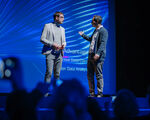Have you ever been in either of these situations? Twenty-four hours before your event starts, you discover that there's an air controllers' strike and the speakers can't get to your event. Or, you have everything as well-prepared as possible, yet when the event begins, you realize that the band failed to appear.
This is just a small example of the multiple crisis situations that can ruin your event. And it doesn't matter if you are a beginner or an experienced event manager, crazy things happen when you least expect them. What can you do, then? Be creative.
Hear me out. I know what you think when it comes to creativity. You see it as something unattainable. When speaking to other event managers, a common theme I heard was, "I'm not creative, but I’m good at logistics." This happens because we misuse the word 'creativity' and are afraid to see it as an everyday tool we can use easily to find solutions and solve problems.
A study reveals that only 1 in 4 people feel that they are living up to their creative potential. Everyone wants to be creative, yet not everyone believes she or he can, especially under pressure. This is not surprising. Two big misconceptions make creativity appear as something unachievable:
Misconception #1: Only people with special talents can be creative.
Misconception #2: You can't be creative during a crisis.
As psychologist Edward de Bono notes, creativity is not a talent, but rather a skill that one can practice and develop. Your brain is not designed to use creativity in its processes, yet when you face a new stressful situation, you can come up with a different approach.
According to a study published in Harvard Business Review, the sense of urgency and the ability to focus can challenge people in a positive way, which helps spark their creativity. So how can you develop a creative mindset that you can use when an event is falling apart?
Here are some ideas that will help you.
1. Be in control of the information.
You can’t be creative if you ignore data. You need to know everything about the event you organize. This will help you gain a global vision and connect the dots if necessary. In his book Serious Creativity: How to be creative under pressure and turn ideas into action, de Bono highlights that the more information we have, the better our creative thinking will be. So if you want to operate quickly and use creativity to solve any event challenges you encounter, you need to be in control of data.
Quick tips for #EventProfs:
- Before the event starts, check if you have all of your service suppliers' contact details so you can reach them easily if needed.
- Make sure there’s someone in your team who also knows all of the event details, so you can confirm or double-check any information you’re unclear about.
- Keep everything registered in a small, portable notebook and check your notes as needed.
2. Train your brain to find uncommon solutions
Don’t jump directly in the battlefield (read 'event') thinking that creative ideas will pop up in your mind without any previous training or practice. The same way you exercise to keep your muscles toned and healthy, you have to train your brain to find uncommon, yet adequate solutions under pressure. First, you have to learn how to sharpen your focus. When you have the power to redirect your attention to handle only one issue at a time, you are able to come up with a creative solution more easily. Second, challenge your mind by trying to do daily tasks in a different way, such as taking a different route home from work. And third, develop a sense of curiosity. Elizabeth Gilbert, the author of Big Magic: Creative Living beyond Fear, believes that curiosity is much stronger than inspiration and it makes people find creative solutions.
Quick tips for #EventProfs:
- To learn how to focus better, use the Pomodoro technique. Work twenty minutes without letting any distractions grab your attention and then rest for five minutes. Repeat this cycle four times, and then take a fifteen-minute break.
- Challenge your mind by brainstorming and coming up with as many creative ideas as possible. Establish a goal, such as how to improve the networking during the event, then list ten or fifteen different ideas that you could apply.
3. Use the lateral thinking techniques
According to Edward de Bono, lateral thinking is about solving problems using unorthodox, unusual, and apparently illogical methods. The author highlights that lateral thinking is concerned with changing concepts and perceptions, which also helps to generate new creative ideas.
Quick tips for #EventProfs:
- When it seems that there are no solutions, manifest willingness and effort to stop and think or 'design' new alternatives using the information you have.
- If you want to find new ideas, focus on things that everyone else overlooks.
- Don't be afraid to provoke your brain by cutting through your traditional thinking patterns. Ignore the obvious solutions and move toward a new idea.
- Learn how to work with concepts and extract ideas from things that are not correlated to your event.
4. Relax and accept the challenge
Being an event manager is already a stressful job, so experiencing more stress because of a new problem won’t help you manifest a creative mindset. Although it's difficult to relax under pressure, know that just a simple change in the way you think may unleash your creativity.
Quick tips for #EventProfs:
- Whenever you feel stressed, take a few deep breaths. Focus on the way you breathe and try to regulate it.
- Relax your muscles and release the tension.
- Even if you feel pressured by the time and urgency of the problem, take a few seconds to calm down and understand the problem.
5. Engage your team in a quick brainstorming session
Although you are in charge of the event, your team is there to help. And what can be more powerful than a few minds working together to solve a problem? The good thing about teamwork is that someone may have an important piece of information that you aren’t aware of. Working together as a team will increase the chances of finding a creative solution and save the event!
Quick tips for #EventProfs:
- Invest time and resources in team-building activities. This will not only strengthen your team’s working dynamic, it will develop mutual trust when it comes to face crisis moments.
- Create a crisis protocol that will help you and your team coordinate efforts in finding new solutions when unexpected challenges occur.
Wrap up
The success of your events depends on how well you can manage unexpected situations. A creative approach gives you the necessary tools to solve the challenges you face before or during the event. Being creative under pressure is not a 'by default' feature or a 'gift' that only the special ones have. You can train and develop your creativity. Are you willing to give it a try?







